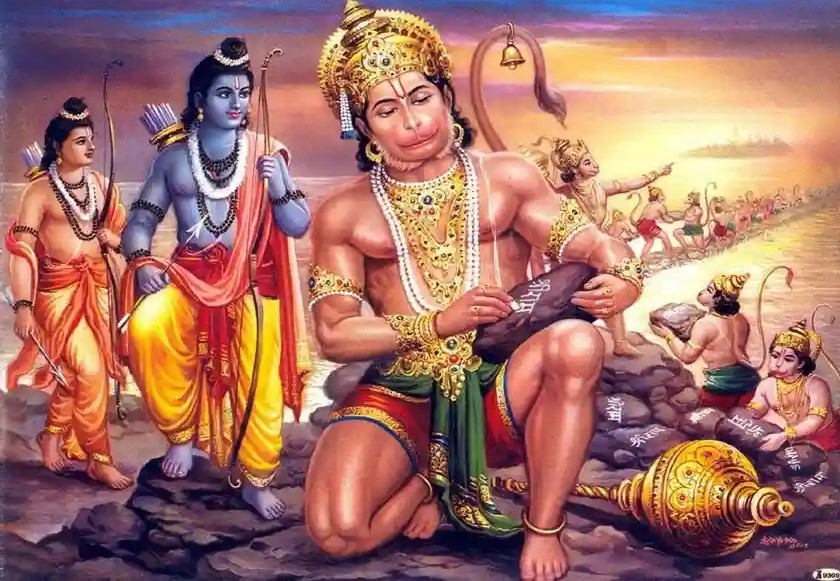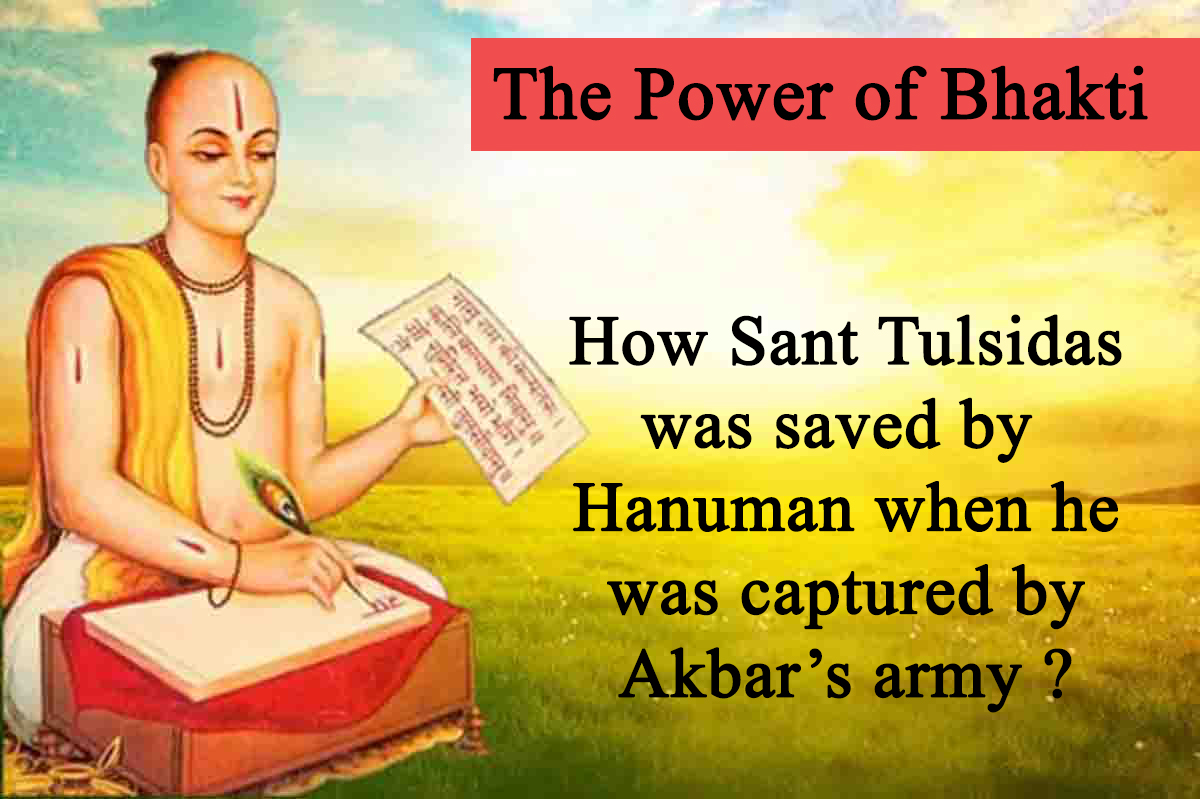Many centuries ago, in the heart of India, lived a saint named Goswami Tulsidas. He was a poet, a saint, and above all, a devotee of Shri Ram and Hanuman. His heart was full of divine love, and his life was dedicated to spreading the message of bhakti—devotion.
It was during one of his deep meditations and loving prayers to Hanuman that he composed the Hanuman Chalisa—a set of 40 beautiful verses praising Hanuman’s strength, courage, and deep love for Shri Ram. Tulsidas wrote it in Awadhi, a simple language, so that even the common people could chant and feel close to the divine.
रामदूत अतुलित बलधामा। अंजनि-पुत्र पवनसुत नामा॥
You are the messenger of Ram, the abode of unmatched strength. You are Anjani’s son and the wind-god’s child.
Tulsidas believed that chanting Hanuman Chalisa could protect one from fear, evil, and suffering. He always lived a simple life, singing glories of Ram and Hanuman, often sitting under trees or in temples, lost in divine thoughts.
But during his time, the Mughal empire ruled much of India. Emperor Akbar, curious about this saint who people said could perform miracles, summoned Tulsidas to his court. When Tulsidas refused to show any miracles, saying “I am just a servant of Ram, not a magician,” Akbar grew angry. He ordered his soldiers to put Tulsidas in prison.
Writing the Hanuman Chalisa
Even in that cruel prison, Tulsidas didn’t lose hope. He turned his pain into prayers. With unshakable devotion, he began writing the Hanuman Chalisa. Each day, he composed a verse, pouring his love for Hanuman into simple words. The prison walls couldn’t stop his spirit. He believed Hanuman, the brave and loyal servant of Ram, would hear him. It reminds of another doha (not a part of Hanuman Chalisa):
तुलसी भरोसे राम के, निर्भय होके सोय।
अनहोनी होनी नहीं, होनी हो सो होय॥
Tulsidas sleeps peacefully, trusting in Ram.
What is not meant to happen will never happen, and what is meant to happen, will surely happen.
“प्रभु प्रताप मैं जग बोलाहा। भूत पिशाच निकट नहिं आवे॥”
By the grace of my Ram, even ghosts and evil spirits cannot come near me.
Inside the dark prison, they tortured him. He had no food, no water for days. They tried many times to kill him, but Tulsidas never cried, never begged. Instead, he kept chanting the Hanuman Chalisa, again and again, with tears in his eyes and love in his voice.
For 40 days and nights, he wrote and prayed. The guards mocked him, but Tulsidas smiled. His faith was his shield. The Hanuman Chalisa grew into a song of power and love, praising Hanuman’s courage and devotion. One famous line from it says:
संकट ते हनुमान छुड़ावै, मन क्रम वचन ध्यान जो लावै।
Hanuman frees us from trouble when the mind meditates on Ram.
The Army of Monkeys
When Tulsidas finished the 40 verses, something amazing happened. On the 40th day, a miracle came. An army of monkeys stormed the city of Fatehpur Sikri! They climbed the walls, broke into the prison, and caused chaos everywhere. The Mughal soldiers were terrified. Monkeys scratched them, threw things, and wouldn’t stop. It was as if Hanuman himself had sent his army to save his devotee.
The guards ran to Akbar, begging him to free Tulsidas. They knew this was no ordinary attack—it was divine power. Akbar, shaken by the sight, ordered Tulsidas to be released. When Tulsidas stepped out, the monkeys stopped their havoc and disappeared. It was a sign of Hanuman’s love for his devotee. Tulsidas looked at the sky and recited:
तुलसी राम भक्ति में, हनुमान सहाय,
संकट मोचन आए जब, मुश्किल जाए थाय।
Tulsi’s devotion to Ram brings Hanuman’s help,
When the trouble-remover comes, all hardships flee.
A Life of Devotion
Tulsidas walked free, his heart full of gratitude. He knew Hanuman had saved him because of his pure love and faith. The Hanuman Chalisa became a gift to the world, a song that millions still sing to feel Hanuman’s strength. Tulsidas spent his life spreading Ram’s name, and his devotion to Hanuman never faded. He wrote one more doha to thank his savior:
तुलसी के प्राण हनुमान में, राम भक्ति का मोल,
चालीसा जपे जग जीते, संकट का न कोल।
Tulsi’s soul rests in Hanuman, the worth of Ram’s devotion,
Chant the Chalisa, win the world, no trouble remains.
The Power of Bhakti
This simple story shows us Tulsidas’s deep love for Hanuman. Even when the Mughals tortured him and tried to kill him, he didn’t waver. His faith turned a prison into a temple, and his words called an army of monkeys to save him. Today, when we sing the Hanuman Chalisa, we feel that same power—Hanuman’s strength and Tulsidas’s devotion, forever joined in those 40 beautiful verses.
From that day on, more and more people started chanting the Hanuman Chalisa, knowing that it was not just poetry—it was a shield of Bhakti, a rope of Divine love, tying every devotee to Hanuman.
And till today, even after hundreds of years, people all over the world chant it, feeling that same warmth, strength, and divine protection that Sant Tulsidas felt inside that prison.
Happy Hanuman Jayanti.
Ram Lakshman Janaki! Jai Bolo Hanuman Ki!
Jai Shri Ram! Jai SiyaRam!






